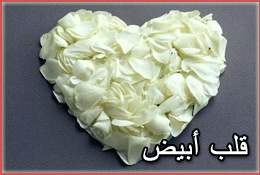-
 jetset saysMon 4th Feb 13@02:43 pmI really like this lesson
jetset saysMon 4th Feb 13@02:43 pmI really like this lesson -
Mumtaz
-
shukran dears, wonderful lesson <3
-
I did some "homework" this evening :)
First I tried to translate the last sentence in the lesson "I hope all your hearts are white", but it does not really sound correct:
امل كل قلبكم ابيض
Then, from the PLC, I wrote (without checking fee qamous) "his intentions are pure" and "his face is blue". Could you kindly correct me, please ;-)
نيته صافية
وجه ازرق
Have a nice wednesday evening, teachers and fellow-students! :) -
Good lesson guys
-
Thank you for the beautiful lesson as always. The PLC was also quite usuful.^^
BTW,regarding colour,it has gender like other adjectives,right? I tried to check it and found the top alif is put when it is masculine.And when it is feminine,it doesn't haveأbut have ةin the end.Is my understanding correct? I appriciate with a little more explanations about this.
Also,about na7la's homework,(Sorry I'm still a beginner so I can't correct) أبيضcan become plural like other adjectives?
Thanks in advance. -
@na7la, whenever you use (I hope - آمل) just use (ّأن) after it, so really in Arabic we always say (I hope that) where (أنّ) here is equivlent to (that). The plural of (قلب) is (قلوب) and finally as we describe a plural word then we use the feminine adjective, so you should use (بيضاء) which is the feminine form of (white). Now, I believe you can amend the sentence and correct yourself :)
As for (نيته صافية) and (وجه أزرق), well done, they are correct but just the word (وجه) means (face) and (his face) means (وجهه) so we really put two (ـه)s. Good job Na7la :) -
@ Kurumi , the masculine form of (white) is (أبيض) while the feminine form is (بيضاء). Also I guess you know that the non-human plural words are described using feminine adjectives, then we should use (بيضاء) in our example. Hope that simplifies it for you.
-
@Ehab,shukran for the explanation.I think I was still mixing up the rule about it,I'll check it out again! :-)
-
Please excuse a digression to English usage of the adjective "black" in relation to "heart" to suggest wickedness. I believe this to be fairly common in literary usage. Here is a reference to it from an on-line dictionary:
World English Dictionary
black (blæk)
— adj
***
9. a. wicked or harmful: a black lie
b. ( in combination ): black-hearted
***
Sorry, could not resist. -
آمل ان كل قلوبكم بيضاء
صح ؟
Two more things here from my side:
1. I thought (ان) would be used only in front of another verb following, so thanks for the enlightenment! ;-)
2. Regarding the plural of (قلب), I thought of the rule that more than 10 (of "anything") require the singular noun. I assumed that Mohammed was talking to more than 10 persons (each of them having one heart), that's why I used the singular! :)
Chazyouwin: Thanks for your digression into English language... Always good to be reminded of useful vocab sleeping somewhere back in one's brain :D
But it also reminded me that I heard Arabic people using the term "black face" in English to describe someone who is very very angry! Does this translate directly from Arabic??
Happy evening كلكم
:) -
Na7la: I don't know whether it translates directly from the Arabic, but in English the phrase his/her "face turned black with rage" or with "anger" are common. See this Boys Life magazine article for example from 1925: http://books.google.com/books?id=zzCrotIz5WgC&pg=PA51&lpg=PA51&dq=%22face+turned+black%22+rage&source=bl&ots=ICp59kXUZT&sig=IqYqe_cUbZPhivj5o-Skix53W48&hl=en&sa=X&ei=vsYZUeCJGLOL0QH1woBA&sqi=2&ved=0CFYQ6AEwBQ#v=onepage&q=%22face%20turned%20black%22%20rage&f=false
On the other hand, I've not heard the precise phrase "black face" here to refer to anything other than the "blackface" makeup used during the 1920s-30s by white theatre and movie actors to play black people. Surely "black face" has been used, but given this other meaning, it would seem to be quite uncommon. -
Thank you for this lesson. I really appreciate it. It's a perfect one using little words like always and but and using a nice expression like white heart. I'll try to use it in my conversations with my friends.
-
It sounds so much like "He has a white dog."
قلب
is very similar to
كلب
in the way it sounds. Even in context it would be difficult for me to distinguish, especially if he actually did have a white dog.
Beginner - White heart
| February 4th, 2013 | 1 comment |
In Arabic the heart can be perceived to be white if it's pure of bad thoughts. Therefore, the phrase "white heart" is often used in Arabic. The closest thing to it in English can be "good heart". Tune in to learn this phrase and more about the cultural aspect around it.
 MP3 Download MP3 Download
|
 PDF Transcript PDF Transcript |
 Audio Transcript Audio Transcript Exercise Exercise PLC PLC Dialogue Dialogue |
| Free | Basic | Premium |
|---|
Join the Discussion

Like this on facebook!

Random Word
صافرة |
|

Advertisement


